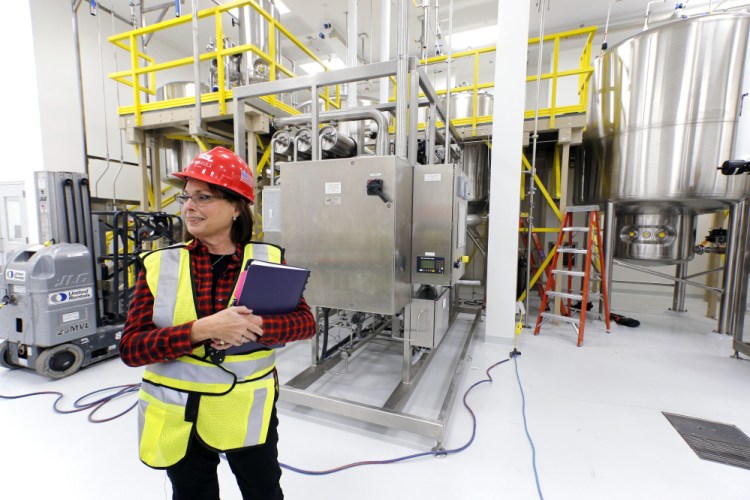Portland-based biotech firm ImmuCell Corp. is being targeted by a law firm after facing a setback in its effort to gain U.S. Food and Drug Administration approval for a new antibiotics-free product aimed at the dairy industry.
But ImmuCell’s top executive said the FDA problem is temporary and indicated that the law firm has no hoof to stand on.
On Tuesday, Pomerantz LLP, a New York City law firm that specializes in investor class-action lawsuits, issued a news release saying it was “investigating claims on behalf of investors” into whether ImmuCell and any of its officers or directors “have engaged in securities fraud or other unlawful business practices,” and it encouraged investors to join the case.
Pomerantz LLP could not be reached on Thursday to elaborate on any issues of alleged securities fraud or unlawful business practices. Its news release did not explicitly accuse ImmuCell of wrongdoing.
ImmuCell, a publicly traded company that develops animal health products for the dairy and beef industries, is seeking approval for a new product called Re-Tain, which treats a condition called mastitis (inflammation of the udders) in lactating dairy cows without the use of antibiotics, saving farmers from having to discard the animals’ milk during the treatment process.
The product has been in development for over 14 years and in the FDA approval process for nearly five years, but last month ImmuCell hit a snag after the FDA rejected the company’s most recent product submission – one of the last requirements for approval – for being incomplete.
The rejection is not a commentary on the quality of ImmuCell’s product and is part of a multistep technical review process. ImmuCell can resubmit samples, which the company plans to do.

Michael Brigham, president and CEO of ImmuCell, stands outside the company’s manufacturing plant in the Riverside area of Portland in 2017. Ben McCanna/Staff Photographer
ImmuCell President and CEO Michael Brigham said in a statement that while the rejection was disappointing, such setbacks are common during the FDA approval process. Brigham said he believes the company can resubmit the application by the end of the year “without incurring significant costs or delays.”
But some investors weren’t as confident and sold their shares in the company on Aug. 24, the day the FDA setback was announced. ImmuCell shares trade on the Nasdaq stock exchange under the symbol ICCC.
When the company announced the negative response from the FDA, its stock price fell by about 13 percent from the previous day’s closing price of $9.09 to $7.92. The solicitation for plaintiffs by Pomerantz followed a week later.
The company’s stock price has since partially recovered, closing at $8.65 on Thursday, and Brigham said he isn’t worried about the law firm’s actions.
ImmuCell is extremely open with investors, he said, and its disclosures are detailed and thorough, including disclaimers that working with the FDA is subject to a lot of risk.
“We tell our investors the truth: that we don’t know it’s going to be approved,” Brigham said in an interview Thursday. “Of course (the rejection) isn’t the best news in the world and some (investors) sold their shares and there was a drop in price, but the bulk of our investors are so well informed that they said, ‘Ah, bummer, but that’s the game with the FDA.’ ”
ImmuCell has kept expectations reasonable, Brigham said, so he doesn’t think Pomerantz will have a case. So far, no lawsuit has been filed.
“It’s not a court action, it’s not a claim,” he said. “It’s a promotional press release, and we’ll see where it goes.”
In the second quarter, ImmuCell reported net income of $141,000 and revenue of $4.5 million. These latest earnings were significantly improved from a year earlier, when it reported a quarterly net loss of $766,000 and revenue of $3 million. The company’s revenue increased by 53 percent from the previous year’s results.
ImmuCell’s flagship product, First Defense, is a natural product that protects against scours, or diarrhea, in newborn calves.
The product is a popular one. So popular, in fact, that demand has outpaced production capacity, and ImmuCell has been steadily working to reduce a backlog of millions of dollars in sales.
Last month, Brigham said the company had reduced the backlog of First Defense orders by over $1 million worth of the product, to under $1.3 million in back orders remaining.
Brigham also expects to see strong demand for Re-Tain whenever it receives approval and is deemed market-ready.
Mastitis, the condition Re-Tain is designed to treat, is the largest cause of economic loss to the dairy industry, he said, costing an estimated $2 billion per year.
Mastitis is treatable, but existing antibiotic treatments render the milk temporarily unsalable.
Re-Tain, though, doesn’t use antibiotics. It is made from a concentrated form of nisin, a naturally occurring antibacterial peptide that is already approved for use as a food preservative in the United States.
If ImmuCell succeeds in obtaining FDA approval, the product would give it a competitive edge in the bovine health industry because milk from cows being treated with nisin still could be sold.
The close link to human consumption prompted the need for prior FDA approval.
Send questions/comments to the editors.




Comments are no longer available on this story